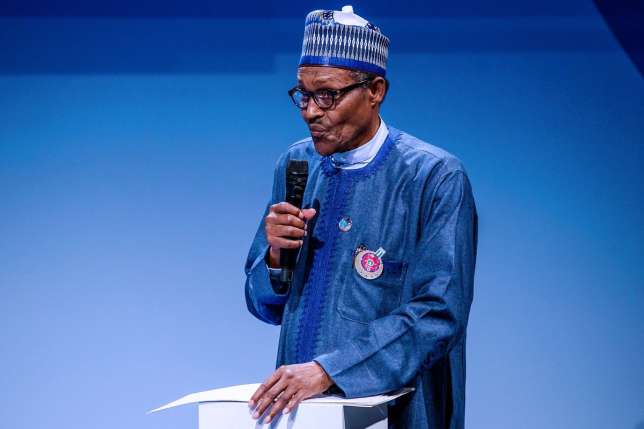Buhari Rolls Out Basic Health Care Provision Fund
President Muhammadu Buhari on Tuesday rolled out the Basic Health Care Provision Fund (BHCPF) appropriated by the National Assembly in the 2018 budget.
The BHCPF is the one per cent of the federal government Consolidated Revenue and contributions from donor grants set aside to fund the basic health needs of Nigerians.
It is the fundamental funding provision under the National Health Act and was appropriated for the first time in the 2018 budget since the Act was signed in 2014.
The federal government earmarked N55 .1 billion for the CRF to the basket fund of the BHCPF, while the Bill and Melinda Gates Foundation contributed $2 million, out of which $ 1.5 million has been released.
The Global Financing Facility (GFF) has also committed $20 million to the fund, while the Department for International Development (DFID) is also putting 50 million pounds sterling over the next five years.
The rollout and implementation of the fund were much anticipated by Nigerians since the appropriation of the fund in the 2018 budget. The fund is expected to help revive the health sector, especially primary healthcare centres (PHCs) many of which have been abandoned across the country.
Apart from rolling out of the BHCPF, the Minister of Budget and National planning, Udoma Udo-Udoma, who represented Mr Buhari at the event, also launched the Second National Strategic Health Development Plan II (2018-2022) and disbursement of funds to high-performing states under the Save One Million Lives Programme for Results (SOML-PforR).
Mr Buhari said he was delighted to launch the key Universal Health Coverage (UHC) documents and flag off the implementation of the Basic Health Care Provision Fund programme.
He said it demonstrated his government’s making the health of Nigerians its top priority.
He explained that the second National Strategic Health Development Plan (2018-2022), approved by the Federal Executive Council September 5 last year, is the health sector’s plan for achieving universal health coverage in Nigeria.
Mr Buhari said this is aligned with the third generation Country Cooperation Strategy, which was also launched Tuesday.
“I had in January 2017 flagged off the Primary Health Care Revitalisation Programme in Kuchingoro to kick-start the plan of having 10,000 functional primary health care facilities with at least one functional health facility in every political ward in the country,” he said.
“Our effort at revitalising the primary healthcare centres is to ensure that quality basic health care service is delivered to the majority of Nigerians irrespective of their locations in the country.
“We shall focus more on the people living in the rural areas and the vulnerable population in our society such as women, children under five years of age and the elderly, in collaboration with national and international partners,” he said.
Mr Buhari said one of the main objectives of the Economic Recovery and Growth Plan of his administration is investing in the Nigerian people.
“Our administration in recognition of this, provided N55 Billion, the 1% Consolidated Revenue Fund to cater for the Basic Health Care Provision Fund in fulfillment of the National Health Act, 2014. International partners such as the World Bank, Bill and Melinda Gates Foundation, and USAID are also contributing to the Fund. The Brand name for this Programme is “HUWE” meaning life.”
Mr Buhari said the BHCPF provides the sustainable fiscal space for health care and will increase the human capital base of Nigeria’s economy. “We must recognise that Universal Health Coverage is a destination and Nigeria is putting in place processes to achieve it,” he said.
Speaking at the event, the Minister of Health, Isaac Adewole, said the BHCPF will operate under very strict accountability and transparency mechanisms.
Mr Adewole said the federal government will ensure that there is no corruption in the use of the funds.
He said the first phase of the rollout of the BHCPF is what was being launched, as the characteristics of the health sector in Nigeria is huge out-of-pocket-spending.
The minister said to curtail this and improve health service delivery in the rural areas that are at disadvantage of good health care delivery, the government is rolling out the BHCPF in six states across the country and the Federal Capital Territory.
“All other states will benefit from the Fund as they fulfill the laid down criteria for accessing the Fund.”
To ensure sustainability and ownership of the BHCPF, he said the states are expected to co-fund the BHCPF, beginning with an initial N100 million as part-expression of interest to implement the BHCPF.
The states are also required to create state health insurance agencies and state primary health care development boards to serve as channels through which implementation would be monitored.
Currently, out-of-pocket payment for health constitutes over 70 percent of total health expenditure in Nigeria. Mr Adewole said to change this narrative in the country to achieving Universal Health Coverage, a functioning Primary Health Care System and a mandatory Universal Health Insurance Scheme are necessary.
Also speaking at the event, The Chairman, Senate Committee on Health, Lanre Tejuosho, said the Senate is almost done with the review of the National Health Insurance Scheme Act.
This he said would improve healthcare services and financing in the country because the Act would make health insurance compulsory for all Nigerians, not optional as stipulated in the current Act.
The senator said he agreed with the consensus that Nigeria should spend more on health.
“We agreed that BHCPF is the key to fund and achieve UHC in Nigeria and let me emphasise that as implementation is about to begin, it will not be business as usual.
“We want the fund to be used for what it is stipulated. Let me say it publicly that though the quantum of resources for the BHCPF is small as compared to the problem on ground, we should use this opportunity to make a difference and not spend unwisely,” he said.



Comments are closed.